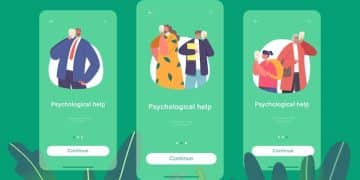Personalized AI’s Dark Side: Filter Bubbles & Mental Health in 2025

In 2025, personalized AI and its filter bubbles could significantly impact mental health by creating echo chambers, increasing anxiety and depression, and reducing exposure to diverse perspectives.
The promise of personalized AI is undeniable, offering tailored experiences that cater to our individual preferences. However, the rise of filter bubbles—echo chambers created by algorithms—presents a concerning dark side of personalized AI: How filter bubbles are affecting your mental health in 2025, potentially leading to increased anxiety, depression, and a distorted view of reality.
Understanding Personalized AI and Filter Bubbles
Personalized AI aims to enhance user experiences by curating content based on individual preferences and online behavior. While this can be convenient, it also creates filter bubbles that limit exposure to diverse perspectives. These bubbles can significantly impact mental well-being by reinforcing existing biases and hindering critical thinking.
How Personalization Works
Personalized AI algorithms analyze vast amounts of data to understand user preferences. This data includes browsing history, social media activity, search queries, and even location. By identifying patterns, AI systems can predict what content users are likely to engage with, creating personalized feeds and recommendations.
The Concept of Filter Bubbles
Filter bubbles, also known as echo chambers, occur when algorithms selectively filter information, showing users content that confirms their existing beliefs and excluding dissenting viewpoints. This can lead to a skewed perception of reality, where individuals are unaware of differing opinions and perspectives.
- Reduced exposure to diverse viewpoints.
- Reinforcement of existing biases.
- Limited opportunities for critical thinking.
The algorithms are designed to maximize engagement, but they can end up by limiting a users knowledge of different perspectives.

The Mental Health Implications of Filter Bubbles
The mental health implications may include increased anxiety, depression, and polarization. When individuals are primarily exposed to content that validates their beliefs, they may become less tolerant of differing opinions and more susceptible to feelings of isolation and alienation.
Increased Anxiety and Stress
Filter bubbles can contribute to increased anxiety and stress by creating a sense of urgency and fear of missing out (FOMO). When individuals are constantly bombarded with content that reinforces their anxieties, they may experience heightened stress levels and vigilance.
Depression and Isolation
Social isolation and loneliness can be greatly accelerated, as relationships with people who have different perspectives become compromised as the user believes their own views more strongly.
- Reduced empathy for others.
- Feelings of hopelessness and powerlessness.
- Increased vulnerability to negative emotions.
The combination of anxiety, stress, and isolation can have a significant impact on overall mental wellness. The lack of exposure to diverse perspectives can also lead to a feeling of being trapped in a echo chamber, leading to decreased psychological safety.
The Role of Social Media Algorithms
Social media algorithms play a pivotal role in creating and reinforcing filter bubbles. These algorithmic systems curate content based on user engagement and interactions, shaping the user’s online experience in ways that are often imperceptible. Therefore, users must be vigilant about what they allow to be visible in their algorithms.
Algorithms’ Impact on Content Visibility
Social media algorithms determine the content users see based on factors such as relevance, engagement, and personal preferences. This can lead to a situation where certain viewpoints are amplified.
Reinforcing Confirmation Bias
Social media algorithms are designed to reinforce confirmation bias, the tendency to favor information that confirms existing beliefs. This can lead to a self-reinforcing cycle where individuals are primarily exposed to content that aligns with their worldview.

Social media algorithms are constantly learning, and the more time you spend online, the better equipped these algorithms are to know what you want and what you do not want.
Strategies for Breaking Free from Filter Bubbles
Breaking free from filter bubbles is essential for maintaining a balanced perspective and promoting mental wellness. Strategies include seeking out diverse sources of information and engaging in critical thinking. By actively diversifying their perspectives, individuals can mitigate the negative impacts of personalized AI.
Seeking Diverse Sources of Information
One effective strategy is to actively seek out diverse sources of information from outlets, including news publications, social media accounts, and online communities. This can help individuals gain a broader understanding of different perspectives and viewpoints.
Engaging in Critical Thinking
Critical thinking involves questioning assumptions, evaluating evidence, and considering alternative perspectives. By engaging in critical thinking, individuals can challenge their existing beliefs and develop a more nuanced understanding of complex issues.
- Questioning assumptions and biases.
- Evaluating the credibility of sources.
- Considering alternative viewpoints and perspectives.
By actively seeking multiple viewpoints, it is possible increase your awareness of how filter bubbles limit perspective.
The Future of Personalized AI and Mental Health
The future of personalized AI and mental health will depend on how effectively we address the challenges presented by filter bubbles. By promoting media literacy and fostering a culture of critical thinking, we can mitigate the mental health risks associated with personalized AI.
Promoting Media Literacy
Media literacy involves understanding how media messages are constructed and how they can influence individuals’ beliefs and attitudes. By promoting media literacy, we can empower individuals to critically evaluate the information they encounter online and make informed decisions about what content to consume.
Fostering a Culture of Critical Thinking
Fostering a culture of critical thinking involves encouraging individuals to question assumptions, evaluate evidence, and consider alternative perspectives. This can help individuals break free from filter bubbles and develop a more nuanced understanding of complex issues.
One can promote media literacy by promoting news literacy. By teaching our children to view, understand and judge news sources, we are better able to create a society of critically thinking adults.
Ethical Considerations and Regulations
Ethical considerations and regulations will play a crucial role in shaping the future of personalized AI and mental health. By implementing ethical guidelines and regulations, we can ensure that personalized AI systems are used responsibly and that individuals’ mental well-being is protected.
Implementing Ethical Guidelines
Ethical guidelines can help ensure that personalized AI systems are developed and used in a way that respects individuals’ rights and promotes their well-being. These principles would require ethical design and a user’s right to know when algoithms are in use.
Regulations to Protect Mental Health
Regulations may be necessary to protect individuals’ mental health from the negative impacts of personalized AI. These regulations could include requirements for transparency, accountability, and user choice. These may include a code of ethics or standards of practice.
Personalized AI is still a young technology, and it is still being heavily developed. It will require vigilance to ensure that ethical considerations are addressed and followed.
| Key Point | Brief Description |
|---|---|
| 📢 Personalized AI | Tailors content based on individual preferences and online behavior. |
| 🧠 Filter Bubbles | Limit exposure to diverse perspectives, reinforcing existing beliefs. |
| 🛡️ Critical Thinking | Question assumptions and evaluate evidence from different sources. |
| ⚖️ Ethical AI | Promotes responsible use of AI, respecting user rights and well-being. |
Frequently Asked Questions
▼
Filter bubbles are personalized information ecosystems created by algorithms that selectively show content aligning with existing beliefs. They form as AI curates information based on users’ online behaviors and preferences.
▼
By limiting exposure to diverse perspectives, personalized AI can increase anxiety and depression. It can also reinforce existing biases and contribute to a skewed perception of reality, affecting mental wellness.
▼
To break free from filter bubbles, seek diverse sources of information, engage in critical thinking, and question assumptions. Also, make a conscious effort to interact with people who hold different viewpoints.
▼
Media literacy is essential to understand how media messages are constructed and how they can influence beliefs. It helps individuals critically evaluate information online and be less susceptible to manipulation within filter bubbles.
▼
Current regulations do not explicitly address the mental health risks of AI and filter bubbles. Future regulations need transparency, accountability, and user choices. This will ensure responsible and fair usage for everyone.
Conclusion
Navigating the complexities of personalized AI requires a mindful approach, with an awareness of the potential mental health implications of filter bubbles. By seeking out diverse perspectives, engaging in critical thinking, and advocating for ethical regulations, we can harness the benefits of AI while safeguarding our mental well-being.





